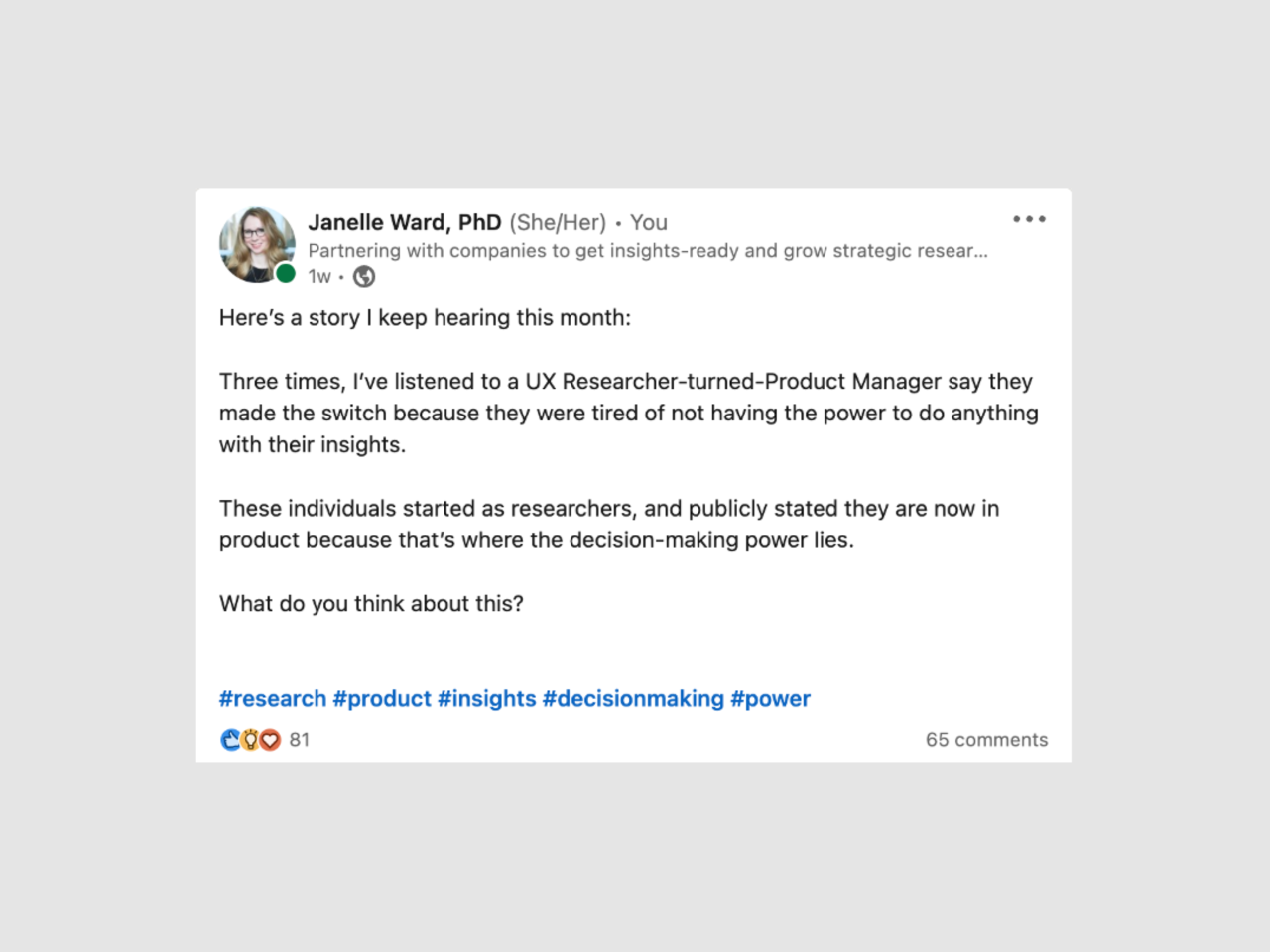Career jumping from UXR to PM

To UX, or not to UX, that is the question.
Published
22 March 2023
Content
Creative
Do product managers hold all the power? Do UXRs need to change career to see their insights actioned? Janelle Ward wades into the debate.
Have you asked yourself lately—why are you a researcher?
What do you love about your role? What frustrates you? What would you change if you could? Would you do the things you love in a different role?
Here’s a story I keep hearing this month:
Three times, I’ve listened to a UX Researcher-turned-Product Manager say they made the switch because they were tired of not having the power to do anything with their insights.
These individuals started as researchers and publicly stated they are now in product because that’s where the decision-making power lies.

Source: LinkedIn.
There are so many potential reactions to this. Here are some brief ones I’ve heard:
“Traitors!”
“So that’s the secret.”
“They’ve learned to work the system! Good for them. Now we’ll have more PMs with solid research skills.”
“This is unsustainable. We are supposed to be working on cross-functional teams where we all bring our expertise to the table. Designers, developers, researchers…We should not have the feeling that the PM holds all the cards.”
The complex relationship between UXRs and PMs
Ah, so we’re back here again. Two short months ago, Outlier published my article called Is product a UX rival or partner? I took a critical look at a 2021 Nielsen Norman Group (NN/g) article titled UXers and Product Managers Both Say Others Intrude on Their Work (part 1, part 2).
The NN/g survey showed evidence that UX and product often duplicate work to frame the conflict between UX and product management. For research tasks in particular—discoveries, user interviews, and user testing—PMs and UXers differed significantly in assigning the responsibility.
However: UXRs moving to PM roles to gain decision-making power—well, that’s a different can of worms. For the UXRs wanting to transition to product management, the problem doesn’t seem to be duplicative research tasks, but rather who gets to decide what happens with the insights from those tasks.
My criticism of the NN/g survey was this: because it looks at global answers, the responses do not necessarily mean conflict occurs within a particular organization. Rather, it’s a commentary on how our roles intersect industry-wide.
And that’s where my previous article crosses with this one: If UXRs are moving into PM roles with the belief that they will hold more decision-making power, this belief results from (their perception of) their specific company culture.
Let’s start there.
The company level: The role of organizational culture
Being a UXR doesn’t automatically exclude you from decision-making power; being a PM doesn’t mean you get it. It depends on the organization.
This is far from my insight alone—check out some of the comments on my post.
Carlos Alvarez de la Vega took a true research perspective and laid out the foundations of a study begging for some curious mind to pursue.
“Might this have to do with the company’s UX maturity?... I’m curious to know more about the context at these folks’ workspaces. Did they switch roles at the same company? Did they leave to focus on the product? How do they exercise that ‘power’ now at their roles?”
In an organization where cross-collaborative trust is high—where researchers are “at the table” and have their perspectives considered in decision-making—this can work well, particularly for researchers who want to feel included in the process.
When that trust isn’t there, and no matter how they try, researchers feel their work is dismissed, frustration grows. In other words, they fail to escape “service mode” (as Jane Davis recently posted).
On the other hand, it all depends on your perspective on how decision-making works. Kristine Kalnina put this well in her comment:
“It’s hard to say where the decision-making power lies. Is it with the one who finally says ‘yes’ to taking action, or with someone who influences the decision makers *into* saying yes? When the head turns left, is it the head that’s turning or the neck that supports it?”
The individual level: The career direction of the tech professional
Let’s back up a minute. Of course, I recognize a few remarks I heard from UXRs-turned-PMs do not represent an industry-wide truth. What if we step back from organizational realities and look at specific individuals making the switch? What motivated them?
Jelena Golubovic, a UXR turned PM, described her choice to transition like this:
“I see work in product as problem-solving, the product discovery phase being key….And yes, the decision-making power is greater, but so is the responsibility and the wider context you have. All of a sudden, it becomes clearer that there are many factors in deciding what gets done next.”
This comment opens up a new understanding of the transition. As researchers, we are told our role is to represent the user through expert research. Turning to product management isn’t choosing power over the user—it recognizes that you thrive in broadening your approach to the problem space.
Do UXRs-turned-PMs still see research as a key part of their job? Jelena has found a way to combine the two with a refreshing perspective on how to handle solution-driven customers in a B2B context:
“I ‘do research’ by turning customer calls into discovery sessions. So if a customer really wants to talk to a PM about how much they need feature X (which is a ready-made solution that may or may not be the right one), I use the face time with them to ask a ton of questions, see what they are trying to do and why and try to get to a shared understanding of their problem.”
To UXR or to PM?
So what’s your role? What do you want to bring to the table? And have you found an organization that allows this type of contribution to shine?
Some companies see the PM as the ultimate decision-maker: managing multiple perspectives and keeping an eye on the big picture. Erik Flowers, cofounder at Practical by Design, provided another great analogy between the roles of UXRs and PMs:
“When it comes right down to it, PMs are the ‘building site superintendents’ and the other IC roles are the subcontractors (framers, concrete pourers, drywallers, electricians, plumbers, roofers... etc.).
The superintendents make sure we have all the building permits, look at the budget that pays the subs, schedules how to stack them (can’t drywall til you rough-in electric, can’t roof until your framers have decking up, etc.). They work with the owner (the homeowner or the commercial building owner, etc.) to monitor their needs, and they also do the ultra-important job of managing change-orders and ensuring overall site safety, etc.
Some people love this, some people hate this, some probably never stopped to think about it, but it’s just the real-world manifestation of how things occur.
If you want to be a labor subcontractor and specialize in a trade, you pick an IC role, maybe even your own company, have a crew of dozens, but no electrician of any seniority ever makes decisions about the whole-home construction.
If you want to be the labor supervisor, be a PM.”
This was eye-opening. However: is it a scenario that all companies live up to? In the tech world, at least from the UXR side, there’s lots of discussion about ensuring our insights are actionable.
If we just do our part and leave the big-picture decisions to someone else, we might not fulfill that actionable aspect—especially if the PM doesn’t see research insights as a part of their decision-making process.
Another perspective worth acknowledging is that some people don’t want decision-making power. Hang Xu recently posted an interview clip with Peter Merholz, who gave this pearl of wisdom:
“The only reason Product Managers have power is because they’re held accountable. They’re like yeah, I’m the person in charge, and I’m the person to blame, and I’ll take that on. And designers are wary of embracing that accountability, at least historically.”
People change their roles all the time. Both personal goals and their environment drive the decision. It’s worth taking moments like these to reflect on how you like to approach the problem space.
Subscribe to Outlier
Juicy, inspiring content for product-obsessed people. Brought to you by Dovetail.